全球化对中国文化的影响 英文
- 格式:ppt
- 大小:2.17 MB
- 文档页数:14
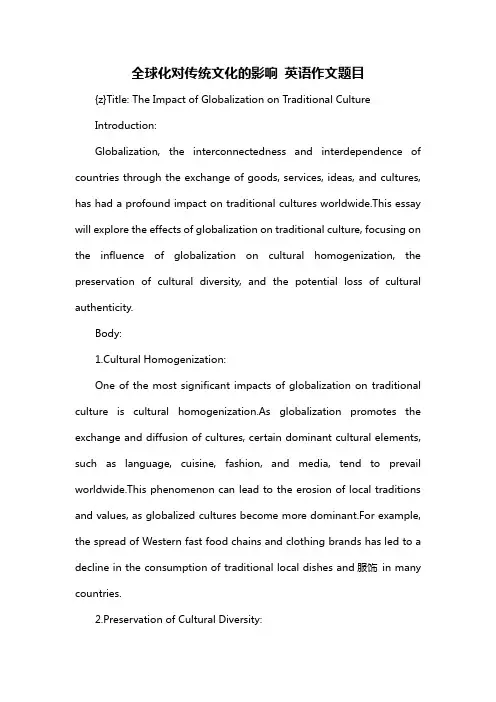
全球化对传统文化的影响英语作文题目{z}Title: The Impact of Globalization on Traditional CultureIntroduction:Globalization, the interconnectedness and interdependence of countries through the exchange of goods, services, ideas, and cultures, has had a profound impact on traditional cultures worldwide.This essay will explore the effects of globalization on traditional culture, focusing on the influence of globalization on cultural homogenization, the preservation of cultural diversity, and the potential loss of cultural authenticity.Body:1.Cultural Homogenization:One of the most significant impacts of globalization on traditional culture is cultural homogenization.As globalization promotes the exchange and diffusion of cultures, certain dominant cultural elements, such as language, cuisine, fashion, and media, tend to prevail worldwide.This phenomenon can lead to the erosion of local traditions and values, as globalized cultures become more dominant.For example, the spread of Western fast food chains and clothing brands has led to a decline in the consumption of traditional local dishes and服饰in many countries.2.Preservation of Cultural Diversity:While globalization contributes to cultural homogenization, it also provides opportunities for the preservation and revitalization of traditional cultures.As people become more aware of the world"s cultural diversity, there is a growing appreciation for traditional crafts, music, dance, and other cultural expressions.Globalization allows for the dissemination of traditional cultural knowledge to a wider audience, enabling marginalized communities to assert their cultural identity and gain recognition for their traditional practices.For instance, the World Wide Web has become a platform for indigenous communities to share their stories, music, and art with a global audience.3.Loss of Cultural Authenticity:The influence of globalization on traditional culture also raises concerns about the loss of cultural authenticity.As traditional cultures become commercialized and commodified, there is a risk of losing the genuine and intrinsic value of these cultures.Tourist destinations, for example, may adopt globalized practices to cater to international visitors, leading to the homogenization of local cultures and the loss of unique cultural experiences.Additionally, the production of traditional crafts and artifacts may be standardized and industrialized, compromising the quality and authenticity of these products.Conclusion:In conclusion, globalization has had a mixed impact on traditionalculture.While it has led to cultural homogenization and the potential loss of cultural authenticity, globalization also provides opportunities for the preservation and revitalization of traditional cultures.To mitigate the negative effects of globalization on traditional culture, it is essential to promote cultural diversity, support local artisans and craftsmen, and raise awareness about the value of preserving cultural authenticity.By striking a balance between globalization and cultural preservation, societies can ensure that traditional cultures continue to thrive in the face of global challenges.。
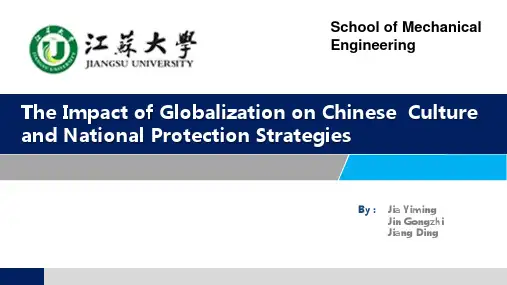
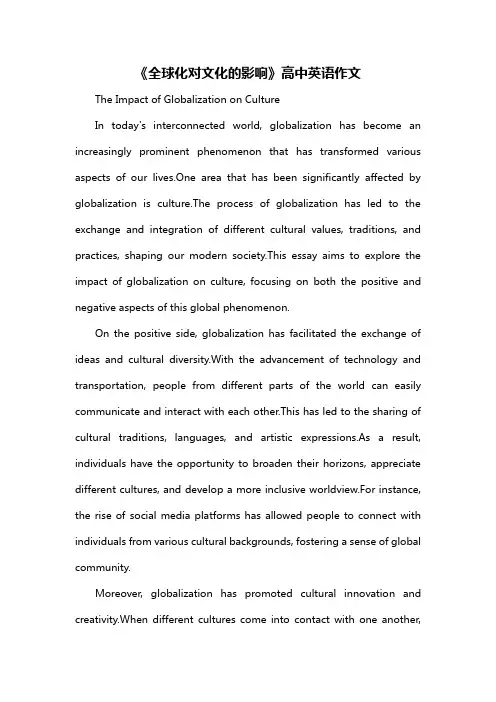
《全球化对文化的影响》高中英语作文The Impact of Globalization on CultureIn today's interconnected world, globalization has become an increasingly prominent phenomenon that has transformed various aspects of our lives.One area that has been significantly affected by globalization is culture.The process of globalization has led to the exchange and integration of different cultural values, traditions, and practices, shaping our modern society.This essay aims to explore the impact of globalization on culture, focusing on both the positive and negative aspects of this global phenomenon.On the positive side, globalization has facilitated the exchange of ideas and cultural diversity.With the advancement of technology and transportation, people from different parts of the world can easily communicate and interact with each other.This has led to the sharing of cultural traditions, languages, and artistic expressions.As a result, individuals have the opportunity to broaden their horizons, appreciate different cultures, and develop a more inclusive worldview.For instance, the rise of social media platforms has allowed people to connect with individuals from various cultural backgrounds, fostering a sense of global community.Moreover, globalization has promoted cultural innovation and creativity.When different cultures come into contact with one another,they often blend and adapt certain elements to create new forms of art, music, and cuisine.This cultural fusion has enriched our cultural landscape and provided us with a wider range of choices.For example, the fashion industry has embraced diverse cultural influences, leading to the emergence of innovative designs that incorporate elements from various traditions.However, globalization also has its negative consequences on culture.One of the main concerns is the erosion of traditional cultural values and practices.As Western culture becomes increasingly dominant through globalization, indigenous cultures risk being overshadowed and marginalized.This can lead to the loss of linguistic diversity, traditional knowledge, and cultural heritage.For instance, the spread of English as a global lingua franca may threaten the survival of smaller languages and dialects.Furthermore, globalization can create cultural homogenization, where diverse cultures are replaced by a single, dominant culture.This phenomenon can result in the loss of cultural diversity and the creation of a monocultural society.For example, the global popularity of fast food chains and multinational corporations may lead to the disappearance of local businesses and traditional culinary practices.In conclusion, globalization has had a profound impact on culture, bringing both opportunities and challenges.On the one hand, it hasfacilitated the exchange of ideas and cultural diversity, promoting innovation and creativity.On the other hand, it has raised concerns about the erosion of traditional cultural values and the potential for cultural homogenization.To preserve and promote cultural diversity in the face of globalization, it is crucial for societies to embrace cultural exchange while also valuing and protecting their own cultural heritage.。
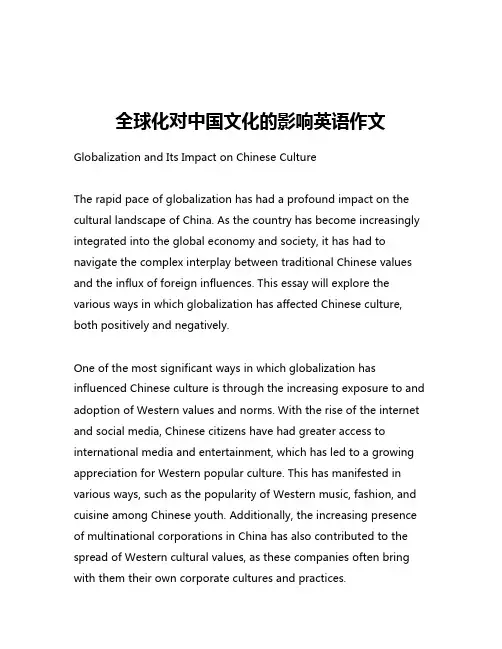
全球化对中国文化的影响英语作文Globalization and Its Impact on Chinese CultureThe rapid pace of globalization has had a profound impact on the cultural landscape of China. As the country has become increasingly integrated into the global economy and society, it has had to navigate the complex interplay between traditional Chinese values and the influx of foreign influences. This essay will explore the various ways in which globalization has affected Chinese culture, both positively and negatively.One of the most significant ways in which globalization has influenced Chinese culture is through the increasing exposure to and adoption of Western values and norms. With the rise of the internet and social media, Chinese citizens have had greater access to international media and entertainment, which has led to a growing appreciation for Western popular culture. This has manifested in various ways, such as the popularity of Western music, fashion, and cuisine among Chinese youth. Additionally, the increasing presence of multinational corporations in China has also contributed to the spread of Western cultural values, as these companies often bring with them their own corporate cultures and practices.However, this exposure to Western culture has also led to concerns about the potential erosion of traditional Chinese values and identity. Many Chinese people, particularly those of older generations, have expressed concerns about the dilution of traditional Chinese culture and the potential loss of cultural heritage. This has led to a growing sense of cultural nationalism, with efforts to preserve and promote traditional Chinese arts, literature, and philosophy.One area where the impact of globalization on Chinese culture has been particularly pronounced is in the realm of language. The increasing use of English in business, education, and popular culture has led to a growing concern about the potential decline of the Chinese language. There have been efforts by the Chinese government to promote the use of Mandarin Chinese and to limit the influence of foreign languages, particularly in the media and education sectors.Another significant impact of globalization on Chinese culture has been the increasing diversity and pluralism within Chinese society. As China has become more integrated into the global economy, it has also become more exposed to a wider range of cultural influences from around the world. This has led to a growing appreciation for cultural diversity and a greater openness to different ways of life and belief systems.However, this increased diversity has also led to some tensions and conflicts within Chinese society. There have been concerns about the potential marginalization of certain cultural and ethnic minority groups, as well as the potential for the erosion of traditional social structures and hierarchies.Despite these challenges, globalization has also brought about some positive changes to Chinese culture. For example, the increased exposure to international ideas and practices has led to a greater appreciation for human rights, environmental protection, and other progressive values. Additionally, the growing interconnectedness of the world has also led to increased cultural exchange and collaboration, with Chinese artists, scholars, and entrepreneurs engaging with their counterparts from around the world.In conclusion, the impact of globalization on Chinese culture has been complex and multifaceted. While it has brought about significant changes and challenges, it has also presented opportunities for cultural enrichment and exchange. As China continues to navigate the complexities of globalization, it will be important for policymakers and cultural leaders to find a balance between preserving traditional Chinese values and embracing the benefits of cultural diversity and international cooperation.。
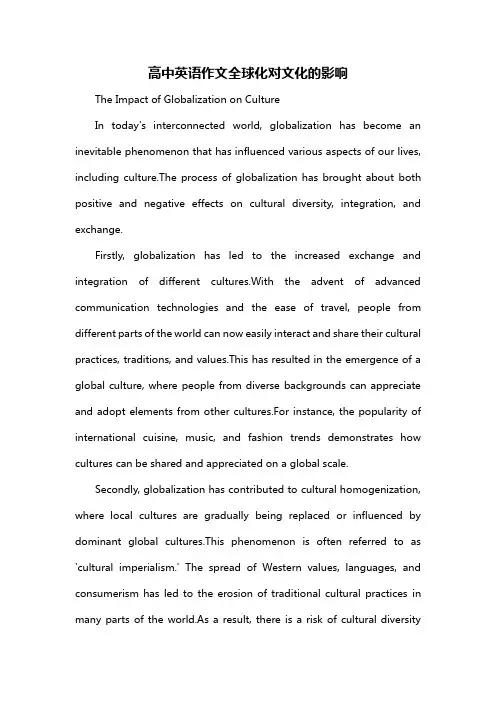
高中英语作文全球化对文化的影响The Impact of Globalization on CultureIn today's interconnected world, globalization has become an inevitable phenomenon that has influenced various aspects of our lives, including culture.The process of globalization has brought about both positive and negative effects on cultural diversity, integration, and exchange.Firstly, globalization has led to the increased exchange and integration of different cultures.With the advent of advanced communication technologies and the ease of travel, people from different parts of the world can now easily interact and share their cultural practices, traditions, and values.This has resulted in the emergence of a global culture, where people from diverse backgrounds can appreciate and adopt elements from other cultures.For instance, the popularity of international cuisine, music, and fashion trends demonstrates how cultures can be shared and appreciated on a global scale.Secondly, globalization has contributed to cultural homogenization, where local cultures are gradually being replaced or influenced by dominant global cultures.This phenomenon is often referred to as 'cultural imperialism.' The spread of Western values, languages, and consumerism has led to the erosion of traditional cultural practices in many parts of the world.As a result, there is a risk of cultural diversitybeing compromised, and local traditions being forgotten or abandoned.However, it is important to note that globalization also presents opportunities for cultural revitalization and preservation.As people become more aware of the importance of cultural diversity, there has been a growing movement to protect and promote local cultures.This is evident in the rise of cultural heritage festivals, indigenous rights movements, and the preservation of endangered languages and traditions.In conclusion, the impact of globalization on culture is a complex issue that encompasses both positive and negative aspects.While globalization has facilitated the exchange and integration of different cultures, it has also posed challenges to cultural diversity and homogenization.It is crucial for individuals and societies to strike a balance between embracing global influences and preserving local cultural traditions to ensure a rich and diverse cultural landscape for future generations.。
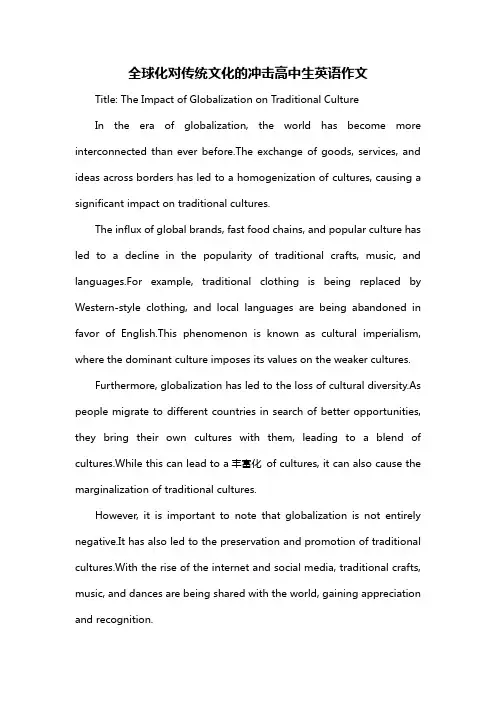
全球化对传统文化的冲击高中生英语作文Title: The Impact of Globalization on Traditional CultureIn the era of globalization, the world has become more interconnected than ever before.The exchange of goods, services, and ideas across borders has led to a homogenization of cultures, causing a significant impact on traditional cultures.The influx of global brands, fast food chains, and popular culture has led to a decline in the popularity of traditional crafts, music, and languages.For example, traditional clothing is being replaced by Western-style clothing, and local languages are being abandoned in favor of English.This phenomenon is known as cultural imperialism, where the dominant culture imposes its values on the weaker cultures.Furthermore, globalization has led to the loss of cultural diversity.As people migrate to different countries in search of better opportunities, they bring their own cultures with them, leading to a blend of cultures.While this can lead to a丰富化of cultures, it can also cause the marginalization of traditional cultures.However, it is important to note that globalization is not entirely negative.It has also led to the preservation and promotion of traditional cultures.With the rise of the internet and social media, traditional crafts, music, and dances are being shared with the world, gaining appreciation and recognition.In conclusion, globalization has had a significant impact on traditional cultures.While it has led to a decline in the popularity of traditional crafts and languages, it has also provided a platform for their preservation and promotion.It is essential to strike a balance between embracing globalization and preserving our cultural heritage.中文翻译:标题:全球化对传统文化的冲击在全球化的时代,世界比以往任何时候都更加相互联系。
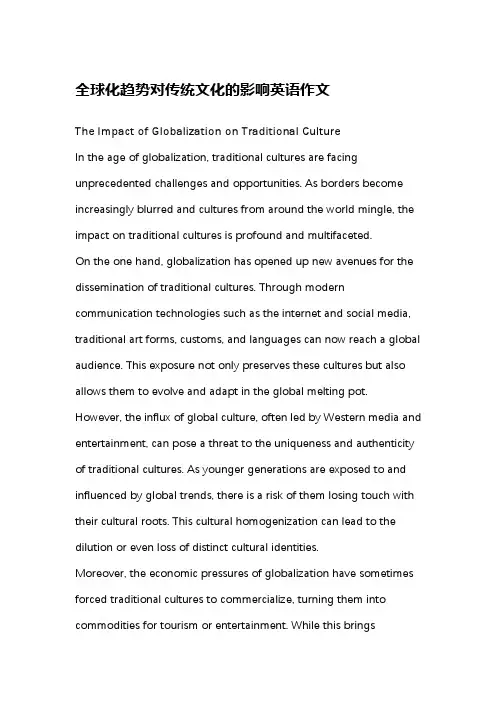
全球化趋势对传统文化的影响英语作文The Impact of Globalization on Traditional CultureIn the age of globalization, traditional cultures are facing unprecedented challenges and opportunities. As borders become increasingly blurred and cultures from around the world mingle, the impact on traditional cultures is profound and multifaceted.On the one hand, globalization has opened up new avenues for the dissemination of traditional cultures. Through modern communication technologies such as the internet and social media, traditional art forms, customs, and languages can now reach a global audience. This exposure not only preserves these cultures but also allows them to evolve and adapt in the global melting pot. However, the influx of global culture, often led by Western media and entertainment, can pose a threat to the uniqueness and authenticity of traditional cultures. As younger generations are exposed to and influenced by global trends, there is a risk of them losing touch with their cultural roots. This cultural homogenization can lead to the dilution or even loss of distinct cultural identities.Moreover, the economic pressures of globalization have sometimes forced traditional cultures to commercialize, turning them into commodities for tourism or entertainment. While this bringseconomic benefits, it can also distort the original meaning and value of these cultures.To strike a balance, it is crucial to promote cultural awareness and education. By teaching the younger generation about the value and significance of their traditional cultures, we can ensure that these cultures are not only preserved but also allowed to flourish in the global context. Additionally, policies should be implemented to protect traditional cultures from exploitation and commercialization, while also encouraging cultural exchange and understanding.In conclusion, globalization has both positive and negative impacts on traditional cultures. It provides new opportunities for cultural dissemination and evolution but also poses risks of cultural homogenization and commercialization. By fostering cultural awareness and implementing protective policies, we can ensure that traditional cultures remain vibrant and relevant in the globalized world.。
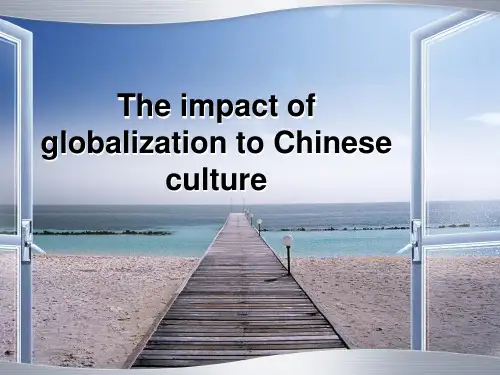
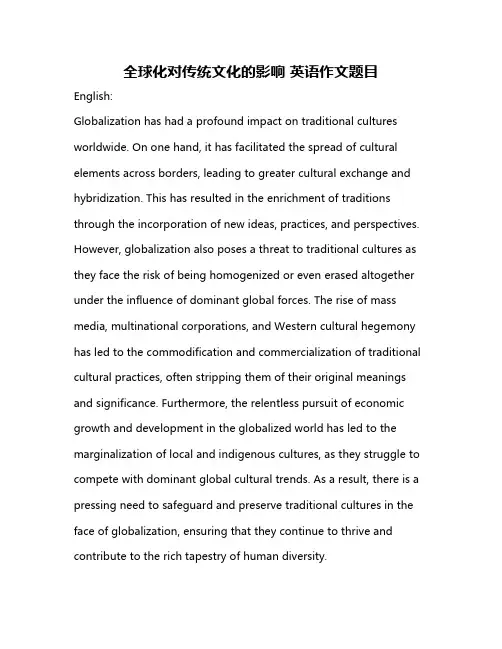
全球化对传统文化的影响英语作文题目English:Globalization has had a profound impact on traditional cultures worldwide. On one hand, it has facilitated the spread of cultural elements across borders, leading to greater cultural exchange and hybridization. This has resulted in the enrichment of traditions through the incorporation of new ideas, practices, and perspectives. However, globalization also poses a threat to traditional cultures as they face the risk of being homogenized or even erased altogether under the influence of dominant global forces. The rise of mass media, multinational corporations, and Western cultural hegemony has led to the commodification and commercialization of traditional cultural practices, often stripping them of their original meanings and significance. Furthermore, the relentless pursuit of economic growth and development in the globalized world has led to the marginalization of local and indigenous cultures, as they struggle to compete with dominant global cultural trends. As a result, there is a pressing need to safeguard and preserve traditional cultures in the face of globalization, ensuring that they continue to thrive and contribute to the rich tapestry of human diversity.Translated content:全球化对世界各地的传统文化产生了深远的影响。

全球化对文化的影响高中生英语作文Title: The Impact of Globalization on CultureIn this increasingly interconnected world, globalization has become an indispensable force shaping various aspects of our lives, including culture.The widespread exchange of goods, services, information, and ideas has led to a profound transformation of cultural landscapes worldwide.This essay aims to explore the multifaceted impact of globalization on culture.On the positive side, globalization has facilitated the exchange of cultural values, traditions, and knowledge.thanks to the internet and social media, people from different corners of the globe can easily connect and share their unique cultural experiences.This cultural exchange promotes mutual understanding and tolerance, fostering a more inclusive and diverse global community.Moreover, globalization has enriched local cultures by introducing new ideas, styles, and trends from different parts of the world.For instance, the spread of international cuisine has enabled people to appreciate diverse flavors and cooking techniques, thereby enhancing cultural diversity.Similarly, the global popularity of music, films, and literature has led to the integration of various cultural elements into local cultural products, inspiring creativity and innovation.However, globalization also poses challenges to culturalpreservation.The dominance of Western culture, particularly American culture, has led to the homogenization of cultural expressions, threatening the survival of indigenous cultures.The spread of global consumer culture has led to the erosion of traditional values and practices in many societies, as people increasingly embrace materialistic and consumer-oriented lifestyles.Furthermore, the dominance of a single cultural narrative can create a sense of cultural imperialism, where the values and norms of the dominant culture are imposed on other societies.This can lead to the marginalization and even extinction of local cultures, as well as the creation of a global cultural monoculture.In conclusion, globalization has had a significant impact on culture, bringing both opportunities and challenges.While it has facilitated cultural exchange and diversity, it has also posed threats to cultural preservation and authenticity.To navigate these challenges, it is crucial for societies to strike a balance between embracing global influences and safeguarding their cultural heritage.By doing so, we can foster a more inclusive, diverse, and culturally rich world for future generations.。
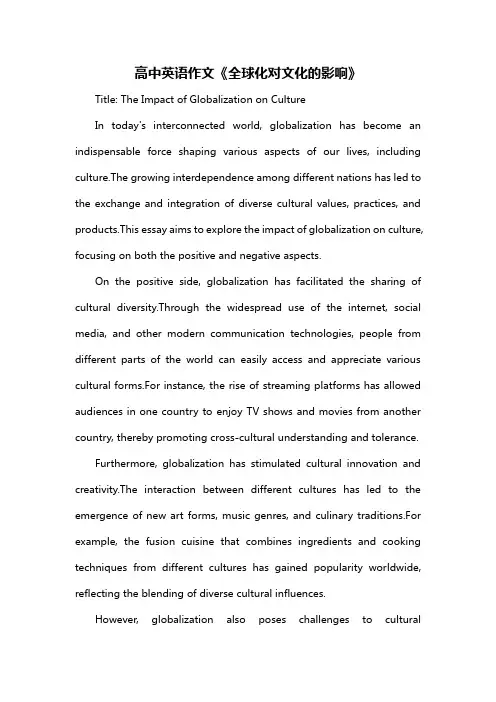
高中英语作文《全球化对文化的影响》Title: The Impact of Globalization on CultureIn today's interconnected world, globalization has become an indispensable force shaping various aspects of our lives, including culture.The growing interdependence among different nations has led to the exchange and integration of diverse cultural values, practices, and products.This essay aims to explore the impact of globalization on culture, focusing on both the positive and negative aspects.On the positive side, globalization has facilitated the sharing of cultural diversity.Through the widespread use of the internet, social media, and other modern communication technologies, people from different parts of the world can easily access and appreciate various cultural forms.For instance, the rise of streaming platforms has allowed audiences in one country to enjoy TV shows and movies from another country, thereby promoting cross-cultural understanding and tolerance.Furthermore, globalization has stimulated cultural innovation and creativity.The interaction between different cultures has led to the emergence of new art forms, music genres, and culinary traditions.For example, the fusion cuisine that combines ingredients and cooking techniques from different cultures has gained popularity worldwide, reflecting the blending of diverse cultural influences.However, globalization also poses challenges to culturalpreservation.The dominance of Western culture, particularly American pop culture, has sometimes led to the erosion of local traditions and languages.For instance, the spread of English as a global lingua franca has threatened the survival of many indigenous languages.This phenomenon, known as cultural imperialism, can result in the loss of cultural diversity and the homogenization of global culture.Moreover, globalization can sometimes create cultural divides.The rapid spread of global cultural products can create a sense of cultural dependency and cultural hegemony, where the dominant culture overshadows local cultures.This can lead to a lack of cultural self-confidence and identity among certain groups, as they may feel pressured to adopt the dominant culture's values and norms.In conclusion, globalization has had a profound impact on culture, bringing both opportunities and challenges.While it has facilitated the sharing and integration of diverse cultural forms, it has also raised concerns about cultural preservation and identity.To navigate these challenges, it is crucial for societies to foster cultural diversity, promote cultural education, and encourage the development of local cultures.By doing so, we can ensure that globalization benefits all cultures, rather than marginalizing or eroding them.。
Globalization's Impact on Chinese Culture In the era of globalization, the intermingling of cultures has become increasingly prominent, and China, as a major player in the global stage, has been deeply influenced by this trend. The impact of globalization on Chinese culture is multifaceted and complex, encompassing both positive and negative aspects.On the positive side, globalization has brought about a surge in cross-cultural exchanges, enabling Chinese culture to reach a wider audience and gain greater recognition internationally. The popularity of Chinese movies, music, and literature has increased significantly in recent years, attracting a large number of foreign admirers. This has not only boosted China's cultural soft power but also promoted the understanding and appreciation of Chinese culture among people from different backgrounds.Moreover, globalization has facilitated the integration of Chinese culture with other cultures, leading to the emergence of new cultural forms and expressions. For instance, the fusion of Chinese elements with Western fashion and design has created a unique aesthetic that isboth fashionable and culturally significant. Similarly, the integration of Chinese music with international genres has produced innovative and appealing musical works that transcend cultural boundaries.However, the negative impact of globalization on Chinese culture cannot be ignored. The influx of foreign cultures and values has led to a certain degree of cultural homogenization, eroding the uniqueness and authenticity of Chinese culture. Younger generations, particularly those born and raised in the digital age, are increasingly influenced by Western popular culture, sometimes at the cost of neglecting their own cultural heritage.Furthermore, the commercialization and standardization of culture under the influence of globalization have posed challenges to the preservation and development oftraditional Chinese culture. Many traditional art forms and crafts are facing extinction due to lack of funding and support, while the standardization of cultural products often leads to a loss of cultural diversity and creativity. To address these challenges, it is crucial for China to strike a balance between embracing globalization andsafeguarding its cultural identity. This requires promoting cross-cultural exchanges while emphasizing the importance of preserving and promoting traditional Chinese culture. It also necessitates fostering a sense of cultural pride and self-confidence among the younger generation, encouraging them to appreciate and inherit their cultural heritage.In conclusion, globalization has brought about both opportunities and challenges for Chinese culture. While it has expanded the reach and influence of Chinese culture internationally, it has also threatened the preservation and authenticity of traditional Chinese culture. It is therefore essential for China to find a way to embrace globalization while maintaining its cultural identity and promoting the diversity and creativity of its cultural expressions.**全球化对中国文化的影响**在全球化时代,文化的交融变得越来越突出,中国作为世界舞台上的重要角色,也深受这一趋势的影响。
Discuss the impact of globalization on China from culture perspective1. IntroductionFormer UN Secretary General Annan once pointed out that globalization is an actual event which would have huge effects on the future of human race. Globalization is led by western countries, so developing countries have less effect in globalization (Lieber & Weisberg, 2002). Globalization becomes a great threat and challenge to both economy safety and sovereignty of developing countries, as well as their cultural security (Compton, 2000). As the world’s largest developing country, China goes faster than any other developing country in the progress of globalization. Coupled with the complex environment of globalization, many social facets in China are being or have been deeply influenced by globalization. Among these influences, Chin a’s cultural development is in a much more dangerous situation. Globalization is a actually, double-edged sword, which brings people both challenges and opportunities.2.Challenges of globalization to Chinese culture2.1 Decline of traditional festivalsIn the process of globalization and with the expansion of cultural communication, western culture sweeps China and of course, this is normal. Only absorbing and integrating foreign culture element can guarantee a national culture a remarkable development. In this culture exchanging progress, people should hold on to the bottom line of national culture. However, as western festivals enter China, more and more Chinese favor foreign festivals rather than their own. Some are indifferent to traditional Chinese festivals and even forget them (Jie, 2003). Certainly, the hype of foreign festivals by the advertisers is one of the reasons. However, what is deeply reflected by this phenomenon is that Chinese are showing a status of bigotry and inapplicability to the globalization(Liu, 2004). It is the bigotry and inapplicability that leads to the great endangerment of traditional Chinese festivals.2.2 Insufficient cultural creative abilityChinese culture and technology cannot make a breakthrough during the feudalism times (Huot, 2000). In the 21th century, feudal forces no longer exist. However, Chinese technology, along with the culture, is still on hold, which may be caused in part by globalization. In the process of globalization, China has introduced a great number of modern cutting-edge technologies. This would have been a good thing. However, the problem is that the dependence on foreign science and technology is too large (Huot, 2000). People only pay attention to introduction but they barely devote themselves to analyzing and digesting the essence of these technologies. This phenomenon directly impairs the ability of self-dependent innovation.2.3 Insufficient cultural autonomyThe process of cultural globalization will inevitably lead to conflicts of various ethnic cultures round the world. A typical example is that the US-led western culture spreads to occupy the dominance of the global culture. It stands in a strong position, forming the so-called "cultural hegemony" (Compton, 2000). Western culture has a powerful integration capability. It strongly radiates other developing countries on national culture. Chinese people are attracted by the highly developed western culture. After reexamining lagging factors within Chinese culture, phenomenon of westernization appears on the surface of Chinese material culture (Guthrie, 2012). For example, dissimilation in language and character, craze for Chinese brands in English names, going abroad craze and so on. This also explains that China is influenced bywestern capitalist culture when it comes to the development of material culture. Facing the highly developed western capitalist material culture, Chinese people are in an extremely passive state. This penetrates further into the deep layer of Chinese culture. Chinese people are lack of autonomy in the development process of national culture.3. Opportunities for Chinese culture brought by globalization3.1 Government’s powerful guiding function to the developmen t of national cultureAmong the course of reform and opening up, Chinese government introduced a series of measures for the preservation and development of national culture. Through cultural legislation, cultural protection systems and policies, cultural management and other means, China had effectively resisted globalization cultural risk to Chinese culture. It shows a powerful guiding function for the development of Chinese culture. For instance, central and local governments at all levels actively exploit the advantages of unique culture to declare world heritages (Bergsten, 2008). From the terms of legislation, Chinese government has already set the Dragon Boat Festival, Mid-Autumn Festival, Sweeping-Tomb Festival and other traditional festivals as national festivals. This indicates that Chinese government begins to attach importance to traditional Chinese culture.3.2 Radiant national culture on the world stageChina's national culture has some backward cultural factors, but overall, China's national culture still has a lot of essence. And some people hold a kind of “western fawning" in mind. This exhibits a shortage of national self-confidence and national pride. China, an ancient civilized country with 5000 years of history, was long regarded as a mysterious nation bywesterners. With the accelerating process of globalization, exchange and dissemination between Chinese culture and foreign cultures move on rapidly. For example, China has built up many Confucius Institutes in many countries in the world. A craze of learning Chinese is sweeping the world. More and more foreigners are attracted by the unique charisma of Chinese culture. This phenomenon demonstrates a Chinese saying, “the more ethnic, the more cosmopolitan” (Pieterse, 2009). Chinese classical Confucian culture of harmony is a great reference to solving the conflict in international relations at present. Chinese culture has shown a dazzling brilliance through international cultural exchange and interaction in the process of globalization on the world stage.4. National culture protection strategies under the background of globalizationGlobalization is indeed a profound historic change of society. Exploring for the protection strategies of ethnic culture in the process of globalization has a considerable strategic significance for China's own development. In the context of globalization, through reasonable and effective means, protecting the nation's outstanding characteristics of cultural helps promote Chinese fine national cultural traditions, maintain a relatively stable social and cultural system, thus to contribute to the consolidation of the stability of the regime (Lu & Lu, 2001). It also contributes to respect and protect China’s ethnic excellent cultures, thus to build a harmonious culture.4.1 Further deepen government’s guiding role in national culture protectionOn the one hand, government should do good advocacy and mobilization. Advocating the social significance and importance of the protection of the excellent national culture through specialized agencies and a variety of convenient social media tools to the general public; mobilizing thepublic to protect the excellent national culture through a variety of strong public opinions. On the other hand, government should enhance its administrative management skill in protecting national culture(Jie, 2003). Government can form an expert group to develop more scientific national culture protecting policies.4.2 Further strengthen legislation to protect national cultureIn order to ensure the protection of national culture and related management policies have legal basis, China's legislature should accelerate the pace of legislation protecting national culture according to China’s current situation. Through related scientific and reasonabl e cultural legislation, China is able to make sure that each level of government could do its job normatively and scientifically in this protection (Huot, 2000). Only the normalization and scientificalness in national culture protection process are secured, will it be possible to win the protection more support and participation from the public, thus to achieve reasonable and effective protection for the excellent national culture.4.3 Positively explore the joint points between foreign cultures and national cultureProtection of national culture does not mean denying the entire foreign culture invasion (Guthrie, 2012). If people want the national culture to grow and spread, sometimes it requires cultural workers to pay attention to seeking joint points between foreign cultures and native culture. Generally, there are much more advanced elements in foreign cultures. Cultural workers should extract the essence of foreign culture, take current situation of national culture as reference and then find out joint points between the two cultures. Under such circumstance, Chinese culture can be more vigorous and energetic.4.4 Transform the protection of national culture into a turning point for economic developmentCulture, as an industry, will bring very significant social and economic benefits through rational exploitation. In the process of protecting national culture, people can dig through the depth of inherent characteristics of national culture to develop a variety of cultural and ethnic characteristics-related tourism (Liu, 2004). People can do works about arts and crafts design, production and sales whose theme is associated with excellent national culture. By transforming the protection of national culture into a turning point for economic development, government let people, especially people who love and have a good knowledge of national culture, get considerable social and economic benefits, thus to attract more and more people to pay attention to the protection work of national culture.5.ConclusionChinese people have a brilliant and 5000 year-long history, which brought the eastern world even the entire globe a wide and profound influence. In the international background of globalization, development of Chinese culture is facing severe challenges as well as opportunities. It is necessary for Chinese people to seize all opportunities the globalization has provided, with the brave spirit of openness, to absorb the essence of western culture and to emphasize the intrinsic spiritual values of national culture at the same time, thus to obtain new development opportunities during the integration with foreign cultures and to realize the modernization of Chinese culture.References:Bergsten, C. F. 2008. China's rise: Challenges and opportunities. Peterson Institute. pp. 2-65.Compton, R. W. 2000. East Asian democratization: impact of globalization, culture, and economy. Greenwood Publishing Group. pp. 18-91.Guthrie, D. 2012. China and globalization: the social, economic and political transformation of Chinese society. Routledge. pp. 1-124. Huot, M. C. 2000. China's new cultural scene: A handbook of changes. Duke University Press. pp. 134-170Jie, L. U. 2003. An Answer to Globalization: Enhancing Culture Self-consciousness Peking University Education Review, 1(6), pp. 43-46. Lieber, R. J., & Weisberg, R. E. 2002. Globalization, culture, and identities in crisis. International Journal of Politics, Culture, and Society, 16(2), pp. 273-296.Liu, K. 2004. Globalization and cultural trends in China. University of Hawaii Press. pp. 4-166.Lu, H. P., & Lu, S. H. 2001. China, transnational visuality, global postmodernity. Stanford University Press. pp. 71-98.Pieterse, J. N. 2009. Globalization and culture: Global mélange. Rowman & Littlefield Publishers. pp. 73-245.。
全球化对中国文化的影响和挑战英语作文Globalization has had a significant impact on Chinese culture, both positive and negative. On one hand, it has increased the exposure of Chinese culture to the rest of the world, allowing people from different countries to appreciate and learn about Chinese traditions, art, and language. However, globalization has also brought challenges to the preservation and development of Chinese culture.One of the most significant positive impacts of globalization on Chinese culture is the increased interest and appreciation of traditional Chinese art forms such as calligraphy, painting, and opera. In recent years, Chinese art has gained popularity worldwide, with many international exhibitions showcasing Chinese art. The popularity of Chinese art has also led to an increase in the number of foreigners learning Chinese calligraphy and painting.Another area where globalization has had a positive impact on Chinese culture is the promotion of Chinesecuisine. Chinese food has become increasingly popular around the world, with Chinese restaurants opening in every corner of the globe. This has not only promoted the richness and diversity of Chinese cuisine, but also helped to boost China's economy.However, globalization has also brought challenges to the preservation and development of Chinese culture. One of the main challenges is the homogenization of cultures due to the spread of Western culture. The influence of Western culture has led to many young Chinese people losinginterest in traditional Chinese culture and adopting Western values and lifestyles instead.Another challenge that globalization has brought to Chinese culture is the commercialization of traditional festivals. Many traditional Chinese festivals have become commercialized, with businesses using them as an opportunity to sell their products. This has led to a decline in the cultural significance of these festivals, with many young people viewing them as just another opportunity to go shopping.In addition, globalization has also led to the erosionof the Chinese language. With the increasing use of English as a global language, many young Chinese people are choosing to learn English over their native language. This has led to a decline in the number of people who can read and write Chinese characters, which is a crucial part of Chinese culture.To address these challenges, the Chinese government has taken steps to promote and preserve Chinese culture. For example, the government has launched a campaign to promote traditional Chinese culture, including calligraphy, painting, and traditional opera. The government has also implemented policies to preserve traditional festivals and protect cultural heritage sites.In conclusion, globalization has had both positive and negative impacts on Chinese culture. While it has increased the exposure of Chinese culture to the rest of the world,it has also brought challenges to the preservation and development of Chinese culture. The Chinese government has taken steps to address these challenges, but more needs tobe done to ensure that Chinese culture continues to thrive in the face of globalization.。
高中生英语作文《全球化对传统文化的冲击》【中英文实用版】The Impact of Globalization on Traditional CultureWith the rapid development of economy and technology, globalization has become an indispensable part of our life.People from different parts of the world can easily communicate and exchange ideas.However, this phenomenon also brings a great challenge to traditional culture.In this essay, we will discuss the impact of globalization on traditional culture and how we can protect it.First and foremost, globalization has led to the homogenization of culture.Due to the widespread influence of Western culture, many traditional customs and practices are gradually being forgotten.For example, in China, the traditional tea culture is being replaced by fast-food culture.This not only affects the physical health of people, but also leads to the loss of cultural diversity.Secondly, globalization has caused the disappearance of many local languages and dialects.As people from different cultures mix more frequently, they tend to use a common language for communication.While this facilitates communication, it also leads to the loss of linguistic diversity.For instance, in many countries, young people are more inclined to use English than their native language, which may result in the eventual extinction of local languages.Lastly, globalization has had a negative impact on traditional industries.As global supply chains become more integrated, many traditional industries are being replaced by more efficient and cost-effective production methods.This not only leads to the loss of traditional skills, but also contributes to the destruction of the environment.To address these challenges, it is essential for us to take action to protect traditional culture.One way is to promote the education of traditional culture in schools.By learning about their own cultural heritage, students will develop a sense of pride and responsibility for protecting it.Another way is to encourage the preservation and promotion of traditional industries.By supporting local products, we can help to ensure the survival of traditional skills and crafts.In conclusion, globalization has indeed brought many benefits to our world, but it has also posed challenges to traditional culture.It is up to us to find ways to protect and promote traditional culture, so that it can continue to thrive in the face of globalization.。
全球化对中国传统文化的影响英语作文Globalization and Its Impact on Traditional Chinese CultureThe rapid pace of globalization in the 21st century has had a profound impact on the traditional culture of China. As the world becomes increasingly interconnected through advancements in technology, communication, and trade, the traditional values, customs, and practices that have defined Chinese society for centuries are facing unprecedented challenges and transformations.One of the most significant ways in which globalization has influenced Chinese culture is through the influx of foreign ideas, products, and lifestyles. The widespread availability of international media, the proliferation of multinational corporations, and the ease of global travel have all contributed to the exposure of Chinese citizens to Western and other cultural influences. This has led to a blending of cultural elements, as Chinese people, particularly the younger generations, have embraced certain aspects of foreign cultures, such as fashion, music, and entertainment.However, the integration of global and local cultures has not been without its complications. The traditional Chinese emphasis oncollectivism, filial piety, and respect for elders has at times clashed with the more individualistic and youth-oriented values promoted by globalization. This has resulted in a cultural tension, as some Chinese people struggle to reconcile their ancestral traditions with the allure of modern, Western-influenced lifestyles.Moreover, the influx of foreign products and services has also had a significant impact on traditional Chinese industries and craftsmanship. The mass-produced, cost-effective goods that are readily available through global supply chains have often overshadowed and threatened the survival of traditional artisanal practices, such as porcelain-making, silk weaving, and calligraphy. This has led to a decline in the preservation and transmission of these cultural legacies, as younger generations are drawn towards more lucrative and globally-connected career paths.Despite these challenges, there are also signs of a resurgence in the appreciation and preservation of traditional Chinese culture. The government has implemented policies and initiatives aimed at promoting the country's cultural heritage, such as the establishment of national cultural heritage sites, the protection of intangible cultural assets, and the encouragement of traditional arts and crafts. Additionally, there is a growing movement among Chinese citizens, particularly the educated middle class, to rediscover and celebrate their cultural roots, as a way of maintaining a sense of identity andbelonging in the face of rapid societal changes.Furthermore, the rise of China's economic and geopolitical influence on the global stage has also contributed to a renewed interest in traditional Chinese culture. As China seeks to project its soft power and assert its cultural influence internationally, there has been a concerted effort to showcase and promote the country's rich cultural heritage, from its ancient philosophies and literature to its traditional performing arts and cuisine.In this context, the impact of globalization on Chinese culture is a complex and multifaceted phenomenon. While it has undoubtedly brought about significant changes and challenges, it has also created opportunities for the revitalization and adaptation of traditional cultural practices. As China continues to navigate the complexities of globalization, the preservation and evolution of its cultural identity will remain a crucial and ongoing endeavor.。